Just the Facts is the official campus fact book. The annual publication provides pertinent campus information including tuition and current budget figures, the number of students and faculty on campus, rankings and recent research breakthroughs accomplished on campus.
 As the highly competitive field of university-based space science and research and development has consolidated in the last 20 years, CU's Laboratory for Atmospheric and Space Physics has emerged as one of an elite group of university space centers able to meet the increasingly stringent requirements of space exploration in the new millennium. Read More »
As the highly competitive field of university-based space science and research and development has consolidated in the last 20 years, CU's Laboratory for Atmospheric and Space Physics has emerged as one of an elite group of university space centers able to meet the increasingly stringent requirements of space exploration in the new millennium. Read More »
 For the past 25 years, clinical psychology Professor David Miklowitz has pioneered a treatment method called family-focused therapy in the battle against bipolar disorder. Read More »
For the past 25 years, clinical psychology Professor David Miklowitz has pioneered a treatment method called family-focused therapy in the battle against bipolar disorder. Read More »
|
 CU-Boulder is one of only three U.S. colleges and universities to receive a 2007 Presidential Award for General Community Service. An estimated 13,397 CU-Boulder students participate in some form of community service and 3,512 are engaged in academic service-learning. Read More »
CU-Boulder is one of only three U.S. colleges and universities to receive a 2007 Presidential Award for General Community Service. An estimated 13,397 CU-Boulder students participate in some form of community service and 3,512 are engaged in academic service-learning. Read More »
|
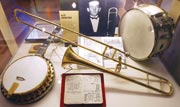
CU-Boulder is home to one of the most extensive
Glenn Miller archives in the world. In 2007 CU-Boulder's
archive of the big band-era trombonist added a new
donation from an English estate, one of the finest
private Glenn Miller collections known.
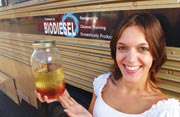
In March 2007, CU-Boulder joined the National Renewable
Energy Laboratory and two local universities in establishing
the Colorado Center for Biorefining and Biofuels.
Known
as C2B2, its mission is to become the world's leading
center for research, education and innovation involving
integration of renewable energy sources into the
chemical and fuels industry.
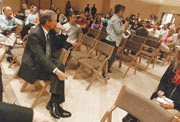
CU-Boulder is finalizing its landmark strategic
plan following a series of community dialogues like
the one featured here on the Boulder campus from
May 2007. Titled Flagship 2030: Serving Colorado,
Engaged in the World, the plan outlines how CU will
maintain its competitiveness in the near term while
transforming to meet Colorado's needs as the state's
flagship higher education institution in the year
2030. The plan's centerpiece is 10 "flagship" initiatives
touching on such areas as creating a three-semester
academic year, instituting customized learning and
multiple-degree tracks and fostering multi-year learning
communities for students.

Two graduate specialty programs were ranked in the
top 10 in the nation and another four in the top
20 in U.S. News & World Report's 2008 America's
Best Graduate Schools issue. Leading the group was
environmental law (4th), followed by physical chemistry
(10th), business entrepreneurship (13th), aerospace
engineering (16th), geology (18th) and chemical engineering
(19th).

CU-Boulder physics doctoral student Michael Thorpe
(above) holds a detection chamber for a new
ultrafast laser apparatus developed by a JILA team
and led by researcher Jun Ye. The laser device can
help researchers identify faint human-breath molecules
that may be biomarkers for disease. Ye (inset) also
leads a team that recently developed a new atomic
clock accurate to within 1 second over 200 million
years.
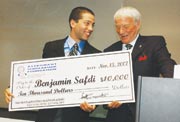
CU-Boulder student Ben Safdi received three prestigious
awards in 2007-08: the Churchill Scholarship, which
provides university and college fees of $25,000 plus
other expenses to Churchill College, the University
of Cambridge; the Goldwater Scholarship of $7,500
per year; and the $10,000 Astronaut Foundation Scholarship.
The engineering physics and applied math major has
received several other CU-Boulder awards and has
been a co-author on two scientific papers. Safdi
is pictured with CU alumnus and astronaut Scott Carpenter
in 2007 after receiving the Astronaut Foundation
Scholarship.

Each semester, about 60 undergraduate "learning
assistants" are working with their professors
to improve introductory math and science classes
through a program called CUTeach. The program also
strives to recruit and train future K-12 science
teachers.
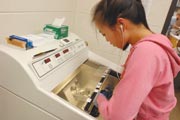
CU-Boulder's Undergraduate Research Opportunities
Program gives undergraduates the opportunity to conduct
real-world research at a major university. Since
its inception in 1986, UROP has provided more than
$5 million to some 6,000 undergraduates for research
and creative work.
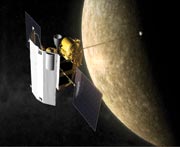
CU-Boulder is the only research institution in the
world to have designed and built space instruments
for NASA that have been launched to every planet
in the solar system.
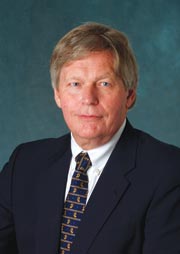
One of seven scientific instruments riding aboard
the MESSENGER spacecraft — which made a flyby of
Mercury last January — was built by CU-Boulder's
Laboratory for Atmospheric and Space Physics. Called
MASCS, the instrument is measuring Mercury's surface
and atmosphere to help scientists determine the distribution
and abundance of the planet's minerals and gases.
LASP Director Dan Baker, right, said the project
will provide "a field day for students," as
abundant data pours back to Earth via MESSENGER.

Scientists from CU-Boulder's National Snow and Ice
Data Center reported in September 2007 that the extent
of Arctic sea ice recorded in that month shattered
all previous lows since satellite record-keeping
began nearly 30 years ago.

Several CU-Boulder research faculty from the National
Snow and Ice Data Center shared the 2007 Nobel Peace
Prize with former Vice President Al Gore for their
contributions to the international report of the
Intergovernmental Panel on Climate Change. The CU-Boulder
researchers, including Tingjun Zhang who was "chapter
leader" for a section of the report on permafrost,
joined co-authors from around the world on the groundbreaking
report.

With the help of a new CU-Boulder invention, corn
and potato crops may soon provide information to
farmers about when they need water and how much should
be delivered. The technology, based largely on a
doctoral thesis by CU-Boulder Research Associate
Hans-Dieter Seelig, includes a tiny sensor that can
be clipped to plant leaves to measure water deficiency
and leaf stress.
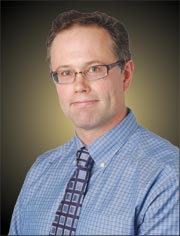
Associate Professor Stephen Yeaple of CU-Boulder's
economics department received the Bhagwati Award
in 2007 for the best article published in the Journal
of International Economics, considered the leading
journal in the field. The award is given every other
year.

Professor Richard Wobbekind presents the Colorado
Business Economic Outlook forum annually in December.
Delivered by faculty from the CU-Boulder Leeds School
of Business, the forum summarizes the overall state
of Colorado's economy and details 13 distinct economic
sectors.

The TREP Café in the business school's newly renovated
and expanded Koelbel Building is student-owned and
operated, giving CU-Boulder students an opportunity
to learn how to run a business. While the cafe isn't
yet profitable, the long-term goal is to put future
earnings back into the Leeds School of Business to
fund entrepreneurship scholarships and specific student
programs and events.
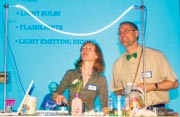
The popular outreach series CU Wizards features
astronomy,
chemistry and physics professors, and focuses on
basic scientific
principles to educate and entertain students of all
ages. Wizards shows are seen by hundreds of school-age
children annually from September through May. Distinguished
Professor Margaret Murnane and Professor Henry Kapteyn,
both of physics, demonstrated how lasers work in
a 2007 Wizards show.

CU-Boulder faculty, staff and students continue
to sign up for a wireless text-messaging service
enabling campus officials to notify them swiftly
via mobile phone in case of a campus emergency. Introduced
in fall 2007, the Short Message Service was one of
several new or improved programs implemented to fine-tune
CU-Boulder's emergency response and communication
programs. As of spring 2008, more than 11,000 faculty,
staff and students have signed up for the service.
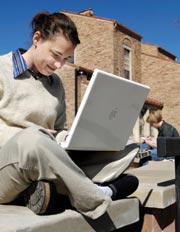
Wireless Internet access is available in nearly
all
classrooms and academic buildings, and most administrative
buildings on campus. All campus residence hall rooms
are equipped with Ethernet connections and most also
have wireless access. A list of buildings with wireless
coverage is available here.
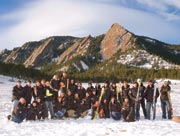
In 2006 the CU-Boulder ski team won the NCAA National
Collegiate Skiing Championship for the 17th time.
Overall, CU-Boulder has won 22 national championships,
including four in cross country and one in football.
